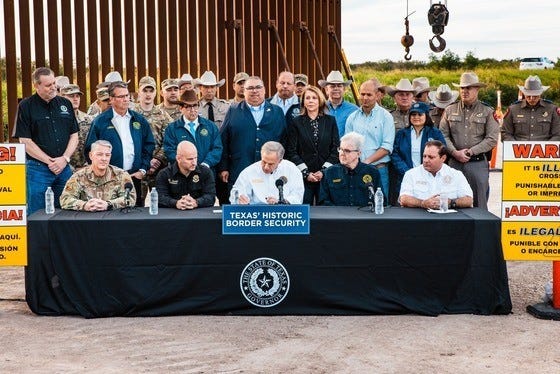Crossing the Line - Texas Now Criminalizes Illegal Border Crossing
Exploring the Implications of Senate Bill 4 and the Clash with Federal Authority
Under a blazing Monday Texas sun, in the heart of the Rio Grande Valley, Governor Greg Abbott inked his signature on a series of bills that dramatically altered the landscape of immigration enforcement.
The bills, striking at the heart of a contentious national debate, transformed illegal entry into the state of Texas into a state crime.
At the signing event, Abbott, flanked by an assembly of law enforcement and political figures, declared that these new laws marked a bold step in Texas' ongoing battle against illegal immigration.
The centerpiece of this legislative package was Senate Bill 4, a law that criminalized unauthorized border crossings, a move that catapulted Texas into the national spotlight and set the stage for a potential legal showdown with the federal government.
The law, slated to take effect in March 2024, was not simply a symbolic gesture. It granted Texas law enforcement the authority to arrest individuals suspected of illegally crossing the Mexican border into the Lone Star State.
This power extended beyond the border regions, encompassing the entire state, and was bolstered by a substantial financial commitment: over $1.54 billion earmarked for continuing the construction of barriers along Texas's sprawling 1,200-mile border with Mexico.
The weight of the situation was not lost on the gathering crowd, either.
As Abbott spoke of Texas defending itself from drug cartels and cast blame on the Biden administration for its immigration policies, the underlying message was clear: Texas was taking matters into its own hands.
"Biden’s deliberate inaction has left Texas to fend for itself," Abbott stated, underscoring the frustration and determination driving the legislation.
However, the bill's passage was far from a unanimous celebration.
Critics, including immigrant rights organizations, Democrats, and former immigration judges, swiftly condemned the legislation as unconstitutional.
They argued that immigration enforcement is a federal responsibility, pointing to past rulings by federal courts, including the U.S. Supreme Court, affirming this principle.
Krish O’Mara Vignarajah, president of the Lutheran Immigration and Refugee Service, voiced concerns that the measures threatened the safety and dignity of asylum seekers and risked undermining the legal system's foundational principles.
The controversy surrounding the bill extended to its practical implications.
For example, while the law made it a Class B misdemeanor to cross the border illegally, with potential jail time for offenders, it also allowed judges to drop charges if migrants agreed to return to Mexico.
This provision raised questions about its enforcement and effectiveness, particularly given Mexico's lack of obligation to accept non-Mexican immigrants deported by Texas.
The Texas legislation did not exist in a vacuum. It echoed previous attempts by states like Arizona to enact their immigration enforcement laws, such as the controversial Senate Bill 1070 in 2010.
However, these attempts had often foundered on legal challenges, including a U.S. Supreme Court ruling that affirmed the federal government's primary responsibility for immigration enforcement.
Abbott's move, while bold and decisive in the eyes of its supporters, thus opened a Pandora's box of legal, ethical, and practical challenges.
It underscored the deep divisions and complexities surrounding immigration policy in the United States, a nation built by immigrants yet grappling with the realities of a modern world where borders, laws, and human rights intersect in often contentious and contradictory ways.
What are your thoughts on the new bill?


